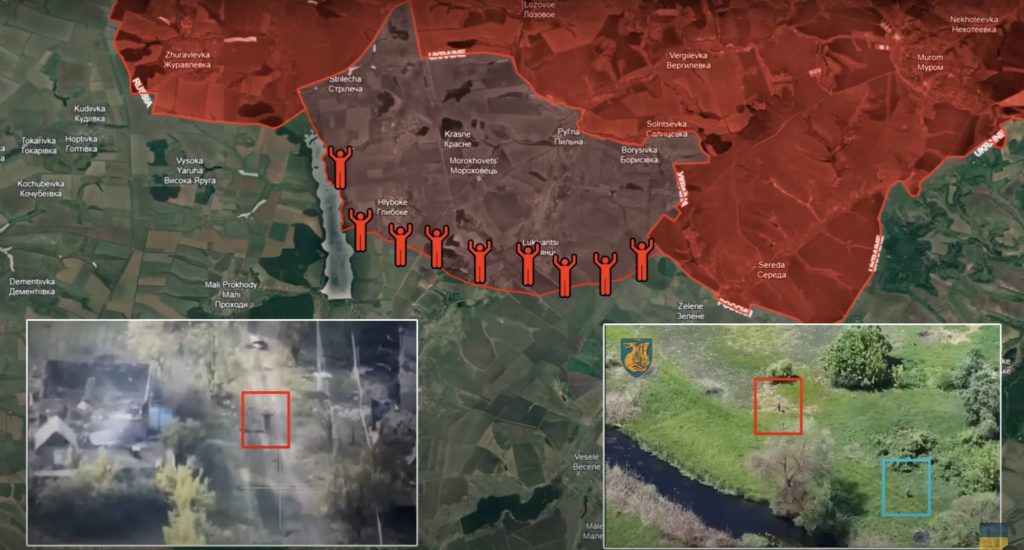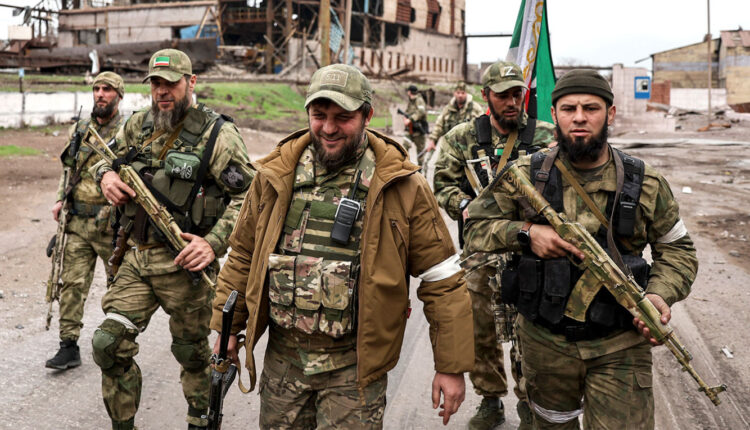Today, there is a lot of news from the Kharkiv direction.
Here, desertion has become a major problem for Russian forces, prompting the deployment of penal units to kill everyone who engages in unauthorized retreats. However, Ukrainians have strategically targeted these penal unit headquarters, ensuring that the desertions continue, further weakening the Russian frontlines.
Ukrainian Commander-in-Chief Oleksandr Syrsky recently emphasized that the primary objective of Ukrainian forces in the region is to inflict maximum losses on Russian troops. By achieving this, Ukrainian forces aim not only to halt Russian advances but also to gradually reclaim lost territory, ultimately pushing the enemy back across the border. This strategy is designed to weaken Russian capabilities and morale, setting the stage for a sustained Ukrainian counteroffensive and the restoration of control over the territory.
Russians surrender and desert positions
As a direct consequence of the relentless Ukrainian efforts, Russian units deployed along the contact line have suffered significant degradation. The first unit to lose its combat effectiveness was the Russian 7th Motorized Rifle Regiment operating near Lyptsi.
Ukrainian military analyst Kostyantyn Mashovets reported that after continuous and costly frontal assaults on fortified Ukrainian positions on the hills north of the settlement, the regiment incurred unsustainable losses. These heavy casualties forced the withdrawal of the 7th Motorized Rifle Regiment from the combat zone for reconstitution.
With these units withdrawn, the remaining Russian forces in the region began to suffer from a lack of support, and under intense Ukrainian counterattacks, they started to buckle under the pressure. Previous reports have highlighted increasing numbers of Russian soldiers surrendering under these conditions.
However, this was merely the tip of the iceberg, as many more Russian soldiers are too fearful to surrender and instead choose to desert. Significant cases of desertion have been detected in the Lyptsi direction, as confirmed by Ukrainian Kharkiv Group of Forces Spokesperson Yuriy Povkh.
The situation has become so critical, with the frontline in the Kharkiv region collapsing, that the Russian command has been forced to take drastic measures, including the introduction of barrier troops to prevent further desertions and maintain order.

Chechen Akhmat Special Forces
Recently, it was confirmed that the Russian Ministry of Defense has transferred elements of the Chechen Akhmat Spetsnaz to the Kharkiv region. Chechen Commander Apty Alaudinov claimed that some of his units are already engaged in active frontline battles.
However, Ukrainian Khortytsia Group of Forces Spokesperson Nazar Voloshyn revealed that, in reality, Akhmat forces are serving as blocking units. These specialized disciplinary units are tasked with preventing unauthorized retreats by firing on their own troops if they attempt to withdraw to the international border area. Military analysts have noted that, based on the Akhmat forces' previous actions in other parts of the frontline, their deployment to Kharkiv is likely intended solely for this purpose, rather than for conducting genuine offensive operations.
Interestingly, Ukrainians have strategically exploited this situation by targeting the deployment sites of Chechen forces, thereby ensuring that the chaos and retreat of Russian soldiers continue unimpeded by these punishment squads.
Geolocated footage reveals the aftermath of multiple successful airstrikes on Chechen force concentrations, further exacerbating the disarray within Russian ranks.
This escalation has intensified the challenges for Russian commanders, compelling them to urgently seek reinforcements to avoid losing already captured territory and to sustain their offensive efforts.
Trending Now
Russians deploy troops to Kharkiv from other fronts
Soon after, reports began to emerge about unspecified Russian units being redeployed from various fronts, including the left bank of Kherson, Chasiv Yar, Pokrovsk, and Kurakhove, as well as from training centers within the Russian Federation.
This suggests that the Russians may still be clinging to their goal of establishing a buffer zone in the northern Kharkiv region. However, Ukrainian Commander-in-Chief General Oleksandr Syrsky has stated that the Russian military lacks the necessary forces to launch a full-scale offensive and breach Ukrainian defenses. Despite these reinforcements, the feasibility of achieving their strategic objectives remains highly doubtful.
Military analysts have identified significant issues hindering Russia's efforts to bolster their combat capabilities. Firstly, after more than two years of intensified clashes, other Russian force groupings lack available combat-ready units and assets at the regiment-brigade level to reinforce the Northern Grouping of Forces. This deficiency hampers their ability to sustain and intensify operations along the border.
Secondly, the temporary reassignment of units from other fronts due to a lack of available forces has proven ineffective. Deploying disparate elements from various detachments has led to poor communication and coordination, ultimately resulting in higher losses.
These issues underscore a critical lack of operational and strategic reserves, which prevents the Russian military from implementing effective measures and finding viable solutions to their ongoing challenges.
Overall, recognizing an opportunity to induce chaos within the Russian army, Ukrainian forces strategically targeted the headquarters of penal units tasked with preventing desertion.
By undermining these disciplinary squads, Ukrainians have created conditions where Russian soldiers can desert more easily, further weakening the Russian frontlines.
This tactical move has enabled Ukrainian forces to exert greater pressure, facilitating easier advances and allowing them to reclaim more territory. This approach not only degrades Russian combat effectiveness but also sets the stage for a broader Ukrainian counteroffensive, gradually pushing Russian forces back and regaining control of the contested regions.
In our regular frontline report, we pair up with the military blogger Reporting from Ukraine to keep you informed about what is happening on the battlefield in the Russo-Ukrainian war.

